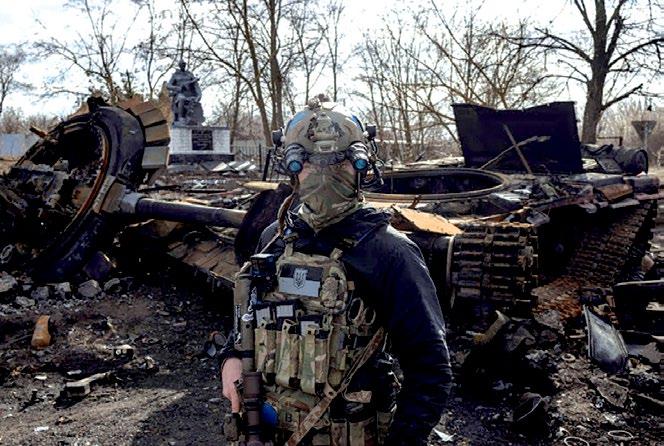
12 minute read
Viewpoint
Biden Administration Quickly Welcomes Ukrainians, Afghans, But Deports Haitians, Africans, Central Americans

Advertisement

The Biden Administration in March announced the issuance of Temporary Protected Status, (TPS), designations for Ukrainians as well as Afghans living in the United States.
That means that 75,100 Ukrainians and approximately 75,000 Afghans living in the U.S. are now eligible to apply for TPS under the new designations.
For Ukrainians, the TPS designation applies to any Ukrainian that was present in the U.S. on or before March 1, 2022, while for Afghans, the TPS designation applies to individuals already residing in the U.S. as of March 15, 2022. For both countries, TPS protections are valid for 18 months.
Those that are approved and granted TPS will be protected from deportation and returning to a country that is not safe as well as be allowed to continue to work, pay taxes and raise their families in the U.S.
It’s a great gesture given the terror of war on Ukraine by Russia and the terror, violence and uncertainty in both countries currently.
At the same time, the Biden administration has expelled or deported over 20,000 black people to Haiti between January 1, 2021, through February 26, 2022, according to data collected by the International Organization for Migration, (IOM).
While Haiti may not be under siege from a foreign invasion, it is enduring what can only be described as a war within as the gangs are the “Taliban of Haiti,” waging killings and kidnappings through control of strategic areas of the country.
“It is unconscionable that any government would send people to Haiti while it experiences such a deterioration in security and a heightened risk to everyone’s life and physical integrity,” said César Muñoz, senior Americas researcher at Human Rights Watch. “No government should return people to Haiti. And the United
States, which accounts for the vast majority of returns, should end the unnecessary and illegitimate use of a public health regulation for abusive expulsions of Haitians.” HRW also points out that given the security conditions in Haiti, civil society groups and organizations assisting returnees have expressed concern that people expelled or deported to Haiti are at risk of kidnapping and extortion by criminal gangs, which may believe returnees have money for travel or relatives abroad who can pay ransoms. Further, there is currently no system FELICIA J. in place to track and support PERSAUD returnees, including those who may not have lived there for years and have no relatives there. Armed conflict and violence are also rife in Guatemala, Honduras, Nicaragua and El Salvador, as well as other in the Cameroon, Nepal, Lebanon, Ethiopia and Mauritania. But instead, the Biden administration has been quick to send immigrants back to countries where their lives could be snuffed out in an instant. Many more are being held like criminals in US Immigration and Customs Enforcement, (ICE), detention facilities for months. So, what’s the difference? It’s hard not to see discrimination written all over this or to view the issue as white vs black. After all, there are many Eastern Europeans living in the US without legal status, but you never hear of them being rounded up and deported. Donald Trump at least told us what he felt and did as he said. Sadly, what we have now is a president and Black, Asian and Caribbean American veep and immigration czar, who said one thing when they needed the Haitian, Black and immigrant vote, but now are viciously showing us through their actions how they really feel. How shameful, how biased, and how deceitful!




- The writer is publisher of NewsAmericasNow.com – The Black Immigrant Daily News.
Y
Yield Not
We are tempted every day of life, some by food, material things, or other pleasures. Even as far back as Biblical times, mankind was given a set of rules with stipulations decreeing that we were not to fall prey to the evils of temptation.
“Thou shalt not covet thy neighbor’s house, his ox, his ass, or his wife?” states the good book. But why are we tempted? Why can’t we be satisfied with what we have? Why do we want more, more, more, and especially what does not belong to us?
There you are, a nice decent wife, minding your own business, with not a shred of temptation dangling before you. Then along comes Joe, smooth walking Joe, slow talking Joe, who fills your head with all the right words. The old saying is: ‘Whispering sweet nothings in your ears.’ And sweet nothings it is too, for it usually has no substance. But it often works.
For the temptation to work though, it has to be compared to something else. The woman sees the temptation, then she thinks of her spouse. She looks at the temptation, then she looks again at her spouse. She sees excitement in the temptation, but boredom and routine in her spouse. The temptation offers her spice, romance, glamour and promise. Her spouse has settled into the domain of the mundane, and she compares. So, she does what many people do when faced with these comparisons, she yields.
Men are tempted every day, for the wandering eye is the root of all temptation. A man will
have the most beautiful woman, yet he yields to the temptation of TONY ROBINSON the girl next door. Why? Is it the sheer thrill of the conquest and getting away with it, or is it that men are basically weak and are prime candidates for temptation? Men simply cannot say: “Get thee behind me.” Which man among you can truthfully and honestly say that if you were away in some far-off land where nobody knows you and a beautiful woman offers up her charms to you, you’ll rebuff those charms and say: “Go away,

(CONTINUED ON PAGE 10)
MATERNITY PLACE
Where the Wonder of New Life Begins

EXPERT MEDICAL CARE WITH ALL THE COMFORTS OF HOME.
To schedule a maternity tour, call 954.759.7400 or visit BrowardHealth.org/MaternityPlace.


BY SIR RON SANDERS
The Commonwealth, made up of 54 nations of which 32 are small states, should be deeply concerned at the grave threat to the international legal order caused by Russia’s invasion of Ukraine, and should act together to show strong disapproval.
This was the theme of a lecture I delivered at the Royal College of Defence Studies in London, on March 7th, to over 100 high-level government and military participants from 47 countries, 14 of which were Commonwealth members. This week’s commentary is a brief outline of some of the points in a 45-minute lecture.
Russian military forces have invaded the sovereign territory of Ukraine in violation of the agreed principles of the United Nations and of international law. In the words of a distinguished group of international lawyers and academics, on March 4: “President Putin’s decision to launch attacks on Ukraine poses a grave challenge to the post-1945 international order. He has sought to replace the rule of law and principles of self-determination for all peoples by the use of force”.
In almost every international forum, the actions of the Russian government have been roundly condemned, and many governments have instituted measures not only to register their strong disapproval, but also to penalize the Russian government.
However, the response of the 54 Commonwealth countries to Russia’s unprovoked invasion of Ukraine has not been uniform. Commonwealth countries are located across the globe. Nineteen of them are in Africa, 8 are in Asia, 13 are in the Americas and the Caribbean, 3 are in Europe and 7 are in the Pacific.
The most telling evidence of the differing positions of the 54 Commonwealth countries is the vote, on March 2, in the United Nations General Assembly on a
Resolution that condemned the Russian invasion. Fortythree of the 54 Commonwealth member states voted in favor of the Resolution; and eleven of them abstained or absented themselves.
Of the 11 Commonwealth countries that abstained or stayed away from the vote 7 were African and 4 were Asian. The three other regions – the Americans and the Caribbean, the Pacific, and Europe – comprising 23 countries, all voted in favor.
To be clear, there was no meeting of governments under a Commonwealth umbrella before the United Nations General Assembly Special Emergency Session on March 2, or at any time, concerning the Russian invasion of Ukraine. Each Commonwealth country voted at the Session, or stayed away from it, either on the basis of its own government’s conviction, or in harmony with other nonCommonwealth organizations of which it is a member. Every small state voted for the Resolution of condemnation.
These small countries would almost automatically oppose any military aggression toward any country or invasion of it. Lacking the military means to defend themselves against a powerful aggressor, and also deficient in economic strength to apply sanctions, these countries depend on respect for the rule of international law and adherence to the principles of the UN Charter to safeguard their sovereignty and territorial integrity. When the walls of international law are breached, these small and militarily powerless nations become even more vulnerable to aggression from others. The arbitrary and unprovoked invasion of Ukraine demanded their immediate condemnation in what they would have considered to be their own interests.
The Commonwealth’s greatest benefit to each of its leaders is that it puts them in close contact with each other at first hand, and privately at their retreats, when the leader of the smallest country can talk with the leader of the largest or richest nation as an equal, in frank discussion.
As a practical matter, no other association of countries brings together governments and non-governmental organizations from every continent in the world that have a voice in almost all regional and multilateral groupings, including the G7, the G20, NATO and a host of multilateral organizations such as the Organisation for Co-operation in Economic Development, the Organisation of American States, the African Union, the Association of South East Asian Nations and the Caribbean Community and Common Market. The potential of a collective Commonwealth outreach into these and other international groups remain of enormous value.
In the present dispensation of international politics and military and economic alliances, it would be impossible to form the Commonwealth today. That it already exists as a forum for international dialogue and debate in an atmosphere of intimacy is a gift to its members.
In this regard, events in Ukraine and the precedent that Russia has now set by discarding international law and replacing
NEWS
The Commonwealth At A Time Of Threat To The International Legal Order
it with force to invade and subjugate the country, should remind the Commonwealth that it, too, has disputes that threaten its member states. Among these are: India and Pakistan over Kashmir; Guatemala which claims all of Belize; Venezuela that claims two-thirds of Guyana; Argentina and Britain over the Falklands Islands; and issues with Turkey over Cyprus. A Ukrainian serviceman walks past the wreck of a As early as 1971, in their Russian tank in the village of Lukyanivka outside Kyiv, Declaration of Commonwealth as Russia’s invasion of Ukraine continues on March 27 Principles, Commonwealth 2022. (PHOTO: REUTERS/Marko Djurica) countries stated that they were “convinced that the Commonwealth is one of the most fruitful associations” for “international co-operation (that) is essential to remove the causes of war, promote tolerance, combat injustice and secure development among the peoples of the world”. That declaration remains valid today, with even greater urgency. The nations of the world are now engaged in a struggle to safeguard the international legal order, which has been gravely threatened by Russia’s invasion of a sovereign State. No states are more vulnerable than small ones which are usually the first victims.
EDITOR’S NOTE: Sir Ronald Sanders is Antigua and Barbuda’s Ambassador to the United States of America and the Organisation of American States. He is also a Senior Fellow at the Institute of Commonwealth Studies, University of London and Massey College in the University of Toronto. - CMC
Y
Yield Not
(CONTINUED FROM PAGE 9) I am sorry, I’m a married man, I cannot yield to your temptation!”
Women are tempted for different reasons, but they are still tempted. For a man it’s mostly visual - a hot sexy, young woman will grab his attention every time. But for a woman, the temptation may stem from her own low feelings, inadequacies, and perceived failures.
She longs to be loved and protected. She’s also tempted by power, for remember, they do say that power is the greatest aphrodisiac. She may have married her high school sweetheart, but sadly, time has taken its toll on the relationship. Unfortunately, his life went nowhere, and she feels cheated and short-changed.
Enter the temptation - her boss. He is everything her husband is not, charming, powerful, self assured and he can protect her. See the comparison again? That makes the temptation even more attractive.
Women love to hear how nice they are and how lovely they look, and sadly many husbands fail to recognize this after a few years have passed. The first man who comes along and fills this need may tempt her to venture down a road that she normally wouldn’t travel on. She yields.
Temptation is a great evil, and if it wasn’t, there wouldn’t be so many platitudes warning of its dangers. Temptation has to be attractive to be successful. Also, to be tempted can be a morale booster, as many persons are flattered to be approached by the tempter. “I yielded because I thought that I was past it, but he made me feel alive and desirable again.”
So, when temptation comes knocking, what will be your response? - “Get thee behind me,” or “Come, let me yield to thee.”
EDITOR’S NOTE: Tony Robinson can be reached at seido1yard@gmail.com
Y








